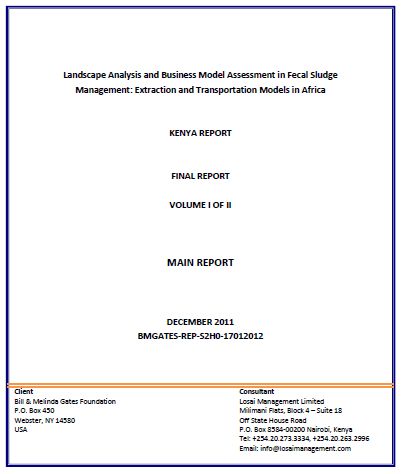Landscape Analysis and Business Model Assessment in Fecal Sludge Management: Extraction and Transportation Models in Africa, Kenya Report - Volume I of II, main report
Mwangi, L., Nzainga, J., Muvelah, S., Kiogora, A. (2011)

Published in: 2011
Publisher:
Consultancy report by Losai Management Limited, commissioned by Bill & Melinda Gates Foundation, Seattle, USA
Author:
Mwangi, L., Nzainga, J., Muvelah, S., Kiogora, A.
Uploaded by:
SuSanA secretariat
Partner profile:
common upload
6298 Views
166 Downloads
Location of library entry
Content - Summary
As per the BMGates criteria for selection of the 3 local case study sites (cities), the Kenya Study Team selected Nairobi – the capital and the largest city - in the center; Mombasa and the second largest city - at the coast, in the east; and Kisumu – the third largest city - by the lakeside, in the west. The 3 cities each have sludge treatment plants and official dumping sites.
Across the three cities FSM policy is generally lacking and as a consequence, the present framework of guiding private sector stakeholders does not lend itself to developing a sustainable industry. A number of areas are in need of public policy intervention
i. Regulation : This has to be centralized and formulated
ii. Licensing: This is not coherent, the licensing regime and the whole system lacks structure
iii. Industry Incentives: These are non-existent and therefore private sector operators have to pay to provide public infrastructure. For example the lack of sufficient tipping points causes long distance travel, which reduces the overall service rate of the industry.
iv. Taxation: Fiscal incentives lack for this industry even which may be deserved since the service often qualifies as an essential service
Three business models proposed which would improve the value chain in the industry. These are
i. Bio-centers as social enterprises: On the whole the Bio-centers have proven to be self- sustaining once capitalized and have demonstrated positive health externalities particularly at the low income household levels.
ii. Microfinance targeted at Sanitation services: A microfinance model and fund targeted at sanitation services would enhance the access to credit to the sub-sector.
iii. Treatment plants enhancement for product drying, packaging and distribution. Treated FS is more affordable that commercial fertilizers. The acceptability of treated FS re-use would be raised by increased public education, though already there is FR-re-use acceptability. Investing in modernizing FSTP to rely less on weather for the drying process would increase annual output. Kenya has wet conditions for 8 months of the year. In addition, because of the bulky nature of treated FS packaging would ease transportation and distribution to market. The large share of agriculture in the economy at 24% of GDP would offer a market for the use of treated FS.
The immediate business opportunity in FSM identified during this study is investing in Bio- centres. The bio-centre service has been noted to be self sustaining entities able to achieve cost recovery and payback the initial capital outlay.
Authors:
Fecal Sludge Management Expert - Lawrence Mwangi - Team Leader
Water and Sanitation Engineer - Jackson Nzainga - Deputy Team Leader
Financial & Institutional Management Specialist - Sammy Muvelah
Social-Economic Specialist - Abonyai Kiogora
Bibliographic information
Mwangi, L., Nzainga, J., Muvelah, S., Kiogora, A. (2011). Landscape Analysis and Business Model Assessment in Fecal Sludge Management: Extraction and Transportation Models in Africa, Kenya Report - Volume I of II, main report. Consultancy report by Losai Management Limited, commissioned by Bill & Melinda Gates Foundation, Seattle, USA
Filter tags
English Faecal sludge treatment processes Fundamental research and engineering Peri-urban Sub-Saharan Africa















